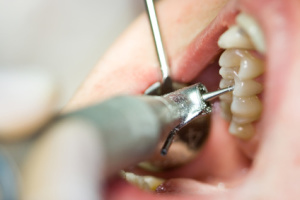Many of our patients know that we consider fluoride an amazing tool. The increased use of fluoride has  changed dentistry radically over the past forty years or so. So although you probably are familiar with fluoride, this post is really to answer the question: Why do I need fluoride? What are the benefits? What are the risks? So lets start with the facts:
changed dentistry radically over the past forty years or so. So although you probably are familiar with fluoride, this post is really to answer the question: Why do I need fluoride? What are the benefits? What are the risks? So lets start with the facts:
Fluoride is a naturally occurring compound found in water, soil and food.
Fortifying drinking water has been recommended by the U.S. Public Health Service to aid in the prevention of tooth decay, they recommend adjusting the naturally occurring fluoride level of existing public and private water sources to reach the optimal level of fluoride which is 0.7-1.2 parts per million or milligram per liter. Fluoride helps prevent cavities by being absorbed into the enamel of the your teeth and fortifying it, making the enamel more resistant to decay and demineralization. This can help in preventing early weakening in the tooth structure and early decay.What are the risks of using fluoride?
The CDC has done numerous studies, the most common risk noticed is dental fluorosis if fluoride is consumed in a high amount for a long period of time during the development of the adult teeth. Dental fluorosis is pitting or mottling of the enamel of the teeth. Children 8 and younger are the most at risk for dental fluorosis. Also, There has been some speculation about a link between fluoride and osteosarcoma however over the past 60 years of fluoride use and studies no link has been established between bone health and fluoride.- The CDC has listed water fluoridation as one of the 10 greatest public health achievements of the 20th century
- The first city to adjust the level of fluoride in its water supply was Grand Rapids, Michigan on January 25, 1945
- Although not all water supply is fluoridated around 72.4% of the U.S. population receive fluoridated water.
- Aside from fluoridated water you can obtain fluoride from a multitude of sources. Such as, fluoride multivitamins for children, in some foods, as well as many mouth rinses and toothpastes.
- Fluoride is endorsed and recommended by the American Dental Association as well as many other state and local dental societies.

 The studies were spurred on by the increase in consumption of sports and energy drinks, especially by adolescents. The study warned that both sports drinks and energy drinks have pH levels that are at a level of acidity that can cause demineralization or weakening of the enamel. Also, they found that they both contain citric acid, included to help improve the taste and shelf life of the drink, which can also have an effect on enamel. The study showed, that although both sports and energy drinks are acidic enough that if excessively consumed they can cause damage to dental enamel, energy drinks have a “significantly greater potential for enamel dissolution than sports drinks”.
The study also brought to light some interesting information:
The studies were spurred on by the increase in consumption of sports and energy drinks, especially by adolescents. The study warned that both sports drinks and energy drinks have pH levels that are at a level of acidity that can cause demineralization or weakening of the enamel. Also, they found that they both contain citric acid, included to help improve the taste and shelf life of the drink, which can also have an effect on enamel. The study showed, that although both sports and energy drinks are acidic enough that if excessively consumed they can cause damage to dental enamel, energy drinks have a “significantly greater potential for enamel dissolution than sports drinks”.
The study also brought to light some interesting information:
